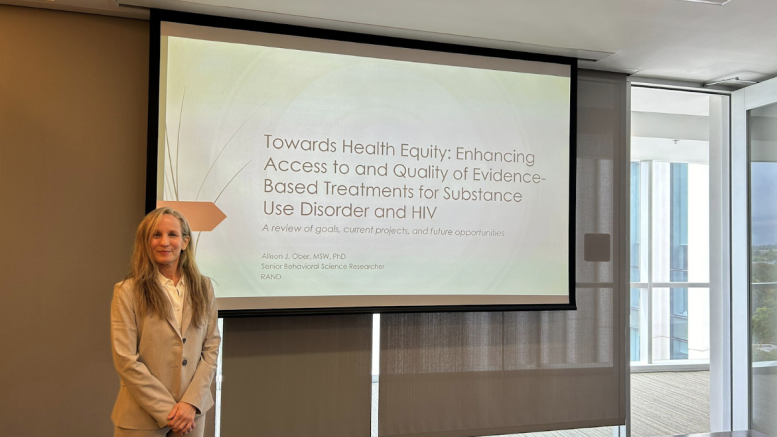Joud Shaat | Contributing Writer
Dr. Allison Ober’s presentation at FIU focused on improving treatment access for substance use disorder and HIV in South Africa, aiming to keep more patients in care. This reflects FIU’s commitment to global health equity.
In a led by Ober, a distinguished figure in HIV and substance use disorder research, insights were unveiled regarding the critical issue of healthcare disparities. With over 25 years of experience, she has been at the forefront of efforts to enhance equitable care for marginalized communities.
The conversation delved into the intricate challenges faced by underserved populations, particularly in accessing evidence-based treatments for substance use disorder and HIV.
Against the backdrop of escalating homelessness and economic instability, Ober shed light on the disproportionate impact of these adversities on vulnerable communities.
“We need to address the structural barriers and systemic inequalities perpetuating disparities in healthcare access and quality,” Ober said.
One of the central themes explored was the intersectionality of race, socioeconomic status, and healthcare outcomes. She emphasized the urgent need to tackle structural barriers and systemic inequities that hinder equitable healthcare access and provision.
The dialogue underscored the transformative potential of compassion-focused interventions in healthcare settings. Ober highlighted the importance of addressing burnout and empathic distress among frontline healthcare workers, noting the positive impact of compassion training on both patient care and provider well-being.
“Compassion training is not only beneficial for patients but also crucial for the well-being of healthcare workers,” she emphasized.
A significant aspect of the conversation centered on the role of peer support mechanisms in HIV treatment and substance use disorder interventions. She discussed the pivotal role of peer-led initiatives in promoting retention in care, reducing stigma, and empowering individuals to engage in their treatment journey.
Throughout the discussion, Ober’s research initiatives emerged as pioneering efforts to bridge the gap between healthcare disparities and equitable care provision. Her commitment to community-engaged research and implementation science underscores a proactive approach to addressing marginalized communities’ complex challenges.
Her research is a hope for achieving health equity and building inclusive healthcare systems. She embodies a steadfast commitment to driving meaningful change in healthcare disparities through her dedication to amplifying marginalized voices and implementing evidence-based interventions.
“Our journey towards health equity begins with understanding and action,” Ober said.






Be the first to comment on "Seminar mentions innovative strategies for HIV Care"